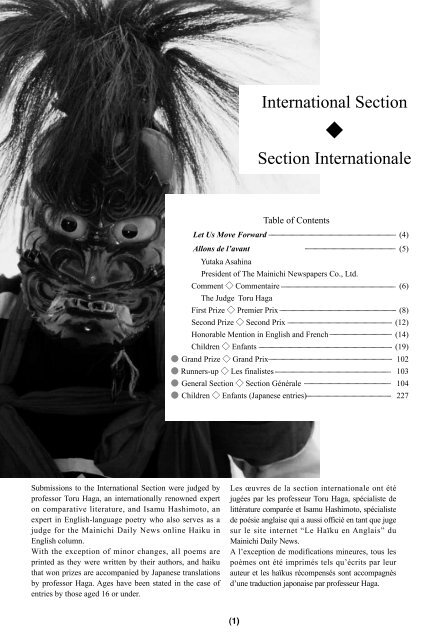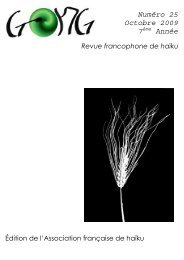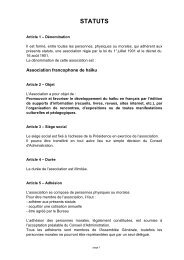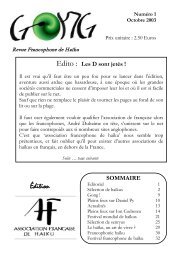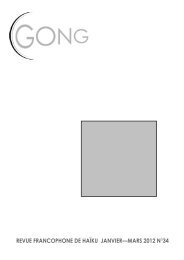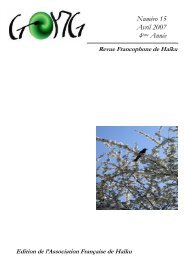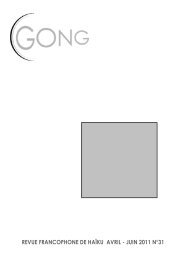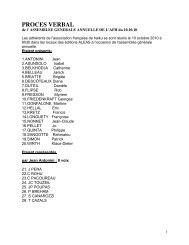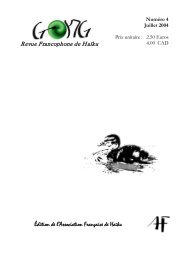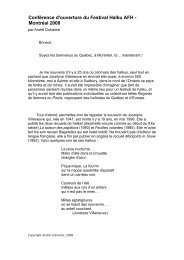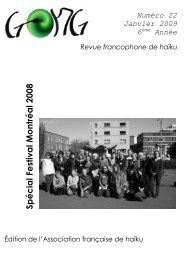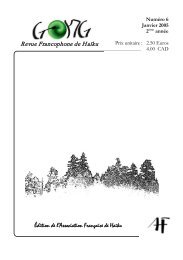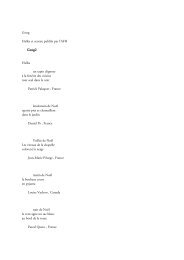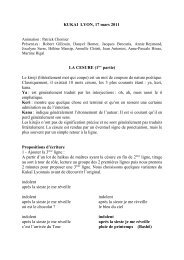les résultats (janvier 2012) - Association Francophone de Haiku
les résultats (janvier 2012) - Association Francophone de Haiku
les résultats (janvier 2012) - Association Francophone de Haiku
You also want an ePaper? Increase the reach of your titles
YUMPU automatically turns print PDFs into web optimized ePapers that Google loves.
Let Us Move ForwardOn the occasion of the 15 th Mainichi <strong>Haiku</strong> ContestYutaka AsahinaPresi<strong>de</strong>nt of The Mainichi Newspapers Co., Ltd.On March 11 this year, we encountered the Great East Japan Earthquake disaster, atragedy said to occur only once in 1,000 years. The giant earthquake and tsunami,which were on a whole new scale compared with previous disasters, ravaged easternJapan. Nearly 16,000 precious lives were lost and even now, almost 4,000 peopleremain unaccounted for. In terms of the sheer number of victims and the wi<strong>de</strong> extent ofaffected areas due to the seriousness of the radiation disaster that followed, it was anunparalleled disaster of a kind that none of us had experienced before.It is probably only natural that many of the haiku we received from around the nationthis year were on the earthquake disaster. To borrow the words of the judges, people indisaster areas sent in haiku composed in a quiet mindset, including unpretentious haikuon the repose of people’s souls and haiku on the feelings of people for their families.From outsi<strong>de</strong> the disaster zone, meanwhile, people composed haiku from a position ofconcern for the disaster areas. In any case, there were many moving haiku.This time a haiku composed by a person who lost their home to the tsunami when thedisaster struck Miyagi Prefecture won an award for excellence. It was heartwarming torealize that in the midst of the tragedy, this person continued to hold hope, and stood upwithout giving up, continuing to move forward one step at a time.In the disaster areas, hard work toward restoration has taken form. People are walkingon without forgetting the dignity of life, human kindness, and the importance of helpingeach other and living strongly today.Those of us in the newspaper industry feel a heavy responsibility to convey the voicesof people in disaster areas, while continuing to report from the scene on the importanceof "life" and "hope" with a <strong>de</strong>termination to carry out our mission as witnesses tohistory to record the journey to restoration.I sincerely thank the many people who submitted entries to this contest, as well as thejudges. Many people from around the world took part in this contest. On this occasion Iexpress my sincere appreciation for the great support Japan received from countriesacross the world.(2)
Allons <strong>de</strong> l’avantA l’occasion du 15 ème Concours <strong>de</strong> haïkus du Journal MainichiYutaka AsahinaPrési<strong>de</strong>nt du journal « The Mainichi Newspapers Co., Ltd. »Le 11 mars <strong>de</strong>rnier, le Japon a subi le Séisme <strong>de</strong> la côte Pacifique du Tōhoku, unetragédie qui ne se produit, dit-on, qu’une seule fois tous <strong>les</strong> 1 000 ans. Le tremblement<strong>de</strong> terre et le tsunami géants, d’une ampleur sans comparaison avec <strong>les</strong> catastrophespassées, ont ravagé l’est du Japon. Près <strong>de</strong> 16 000 précieuses vies ont été ôtées et mêmeà ce jour, environ 4 000 personnes restent portées disparues. En termes du nombre <strong>de</strong>victimes et <strong>de</strong> l’étendue <strong>de</strong>s zones touchées par le grave acci<strong>de</strong>nt nucléaire qui a suivi,c’est une catastrophe sans précé<strong>de</strong>nt qu’aucun d’entre nous n’avait connue auparavant.Il est sans doute naturel qu’un grand nombre <strong>de</strong>s haïkus que nous avons reçus <strong>de</strong> toutle Japon cette année aient porté sur cette terrible catastrophe. Pour reprendrel’expression du jury, <strong>les</strong> personnes <strong>de</strong>s zones sinistrées nous ont fait parvenir <strong>de</strong>s haïkuscomposés dans un état d’esprit paisible, y compris <strong>de</strong>s haïkus sans prétention priantpour le repos <strong>de</strong> l’âme <strong>de</strong>s victimes ou sur <strong>les</strong> sentiments <strong>de</strong>s auteurs envers leurfamille. Depuis l’extérieur <strong>de</strong> la zone touchée cependant, <strong>les</strong> personnes ont composé <strong>de</strong>shaïkus exprimant l’inquiétu<strong>de</strong> pour <strong>les</strong> régions sinistrées. Quoi qu’il en soit, il y avaitbeaucoup d’œuvres poignantes.Cette fois-ci, un haïku composé par une personne ayant perdu sa maison dans letsunami lorsque la catastrophe a frappé la préfecture <strong>de</strong> Miyagi a remporté un prixd’excellence. Il était émouvant <strong>de</strong> constater qu’en pleine tragédie, elle ne perdait pasespoir, et se relevait sans renoncer, pour progresser résolument, pas à pas.Dans <strong>les</strong> régions sinistrées, le dur travail pour la restauration s’est mis en place. Leshabitants vont <strong>de</strong> l’avant sans oublier la dignité <strong>de</strong> la vie, la bonté humaine, l’importance<strong>de</strong> l’entrai<strong>de</strong>, et <strong>de</strong> vivre pleinement chaque jour.Nous qui travaillons dans l’industrie <strong>de</strong> la presse sentons la lour<strong>de</strong> responsabilité <strong>de</strong>transmettre la voix <strong>de</strong>s habitants <strong>de</strong>s zones sinistrées tout en continuant <strong>de</strong> rendrecompte, <strong>de</strong>puis le terrain, <strong>de</strong> l’importance <strong>de</strong> la « vie » et <strong>de</strong> l’ « espoir » avec la détermination<strong>de</strong> mener à bien notre mission en tant que témoins <strong>de</strong> l’histoire afin <strong>de</strong> consigner le cheminvers la restauration.Je remercie sincèrement <strong>les</strong> nombreuses personnes qui ont soumis leurs compositionsà ce concours, ainsi que le jury. Beaucoup <strong>de</strong> gens du mon<strong>de</strong> entier ont participé à ceconcours. Je tiens également à saisir cette occasion pour exprimer ma sincère gratitu<strong>de</strong> àl’égard <strong>de</strong> l’immense soutien dont le Japon a bénéficié <strong>de</strong> la part <strong>de</strong> pays du mon<strong>de</strong>entier.(3)
CommentCommentaireThe judge ◇ Le jugeToru HAGA芳 賀Un grand nombre <strong>de</strong> haïkus participant cette année ont déploré <strong>les</strong> dommagescausés par le tremblement <strong>de</strong> terre du Tōhoku et la contamination par la centralenucléaire. Beaucoup d’entre eux sont cependant tombés dans une forme stéréotypéeet leur ton manquait d’affliction. Les œuvres soumises par <strong>les</strong> Japonais étaientgénéralement insouciantes et optimistes, mais manquaient en revanche <strong>de</strong> tranchantdans le traitement <strong>de</strong> leur sujet. Les œuvres étrangères ont montré une plus gran<strong>de</strong>capacité à capter l’obscurité <strong>de</strong> la vie et <strong>de</strong> la société et la lueur d’espoir perçant àtravers <strong>les</strong> ténèbres.徹There were many haiku this year lamenting the sacrifices arising from the Tohokuearthquake disaster and nuclear power plant contamination. However, many of thesefell into a typical pattern, and lacked a pensive tone. The submissions by Japanesewere generally carefree and optimistic, and in contrast, lacked a cutting edge. Foreignsubmissions showed more of an ability to capture the darkness of life and society andthe ray of hope shining through that darkness.TORU HAGA is former presi<strong>de</strong>nt of the Kyoto University of Art and Design anddirector of the Shizuoka Prefectural Museum of Art. He is also a professor emeritusof comparative literature and culture at the University of Tokyo, where he completedhis Ph.D. after studying at the University of Paris on a French governmentscholarship. Haga is the author of numerous books and artic<strong>les</strong>, including “Cent ansd’etu<strong>de</strong>s françaises au Japon,” “The Diplomatic Background of Japonisme: the Caseof Sir Rutherford Alcock,” and “Kaiga no Ryobun,” which won him an Osaragi JiroPrize in 1984. A laureate of several awards, Haga received a Medal with PurpleRibbon in 1997. He is well versed in haiku too.TORU HAGA est non seulement Directeur du Musée d’Art préfectoral <strong>de</strong> Shizuoka etspécialiste <strong>de</strong> littérature et culture comparées mais également Prési<strong>de</strong>nt honoraire <strong>de</strong>l’Université <strong>de</strong>s arts et du <strong>de</strong>sign <strong>de</strong> Kyoto et Professeur émérite à l’Université <strong>de</strong> Tokyooù il a complété son doctorat après avoir étudié à l’Université <strong>de</strong> Paris, grâce à une boursedu Gouvernement français. M. HAGA est l’auteur <strong>de</strong> nombreux ouvrages et artic<strong>les</strong>,comprenant « Cent ans d’étu<strong>de</strong>s françaises au Japon », « The Diplomatic Background ofJaponisme: the Case of Sir Rutherford Alcock » et « Kaiga no Ryobun » qui lui a valu lePrix Osaragi Jiro en 1984. Lauréat <strong>de</strong> nombreux prix, M. HAGA a reçu la médaille avecRuban Mauve en 1997. Il est aussi bien versé dans <strong>les</strong> haïkus.(4)
東 北 の 大 震 災 と 原 発 汚 染 の 犠 牲 を 悼 む 句 が 多 かった。だがその 多 くは 類 型 化 していて、 沈 痛 な 声 に 乏 しかった。 日 本 人 の 応 募 作 は 一 般に 気 楽 で 楽 天 的 、 対 象 に 切 りこむ 力 が 弱 い。 外 国 人 作 の 方 が、 人 生 ・社 会 の 暗 さと、その 暗 さから 射 す 光 をとらえる 力 を 見 せた。芳 賀 徹 (はが・とおる)昭 和 6(1931) 年 、 山 形 県 生 まれ。昭 和 28 年 、 東 京 大 学 教 養 学 部 を 卒 業 、 同 30 年 〜 32 年 、フランス 政 府 給 費 留 学 生 としてパリ 大 学 に 留 学 、 同 35 年 、 東 京 大 学 大 学 院 比 較 文 学 比 較 文 化 専 攻 、 博 士 課 程 を 修 了 。38 年 、 東 京 大 学 教 養 学 部 専 任 講 師 、40 年 助 教 授 、40 〜 42 年 プリンストン 大 学 客 員 研 究 員 、50 年 東 京 大 学 教 養 学 部 教 授 。 平 成 3 年 より 国 際 日 本 文 化 研 究 センター 教 授 。 同 4 年 、 東 大 教授 を 退 官 。この 間 、 昭 和 50 〜 51 年 、ウッドロー・ウイルソン 研 究 所 (ワシントン) 研 究 員 。専 門 は、 近 代 日 本 比 較 文 化 史 、 比 較 文 学 。 昭 和 60 年 、 東 京 大 学 文 学 博 士 。 現 在 、 京 都 造 形 芸術 大 学 名 誉 学 長 、 東 大 名 誉 教 授 、 静 岡 県 立 美 術 館 館 長 。 平 成 9 年 、 紫 綬 褒 章 受 章 。著 書 に『 大 君 の 使 節 』、『 明 治 維 新 と 日 本 人 』、『 渡 辺 崋 山 ・ 優 しい 旅 びと』、『みだれ 髪 の 系 譜 』、『 平 賀 源 内 』( 昭 和 56 年 、サントリー 学 芸 賞 )、『 絵 画 の 領 分 』( 昭 和 59 年 、 大 佛 次 郎 賞 )、『 與謝 蕪 村 の 小 さな 世 界 』、『 文 化 の 往 還 』、『ひびきあう 詩 心 俳 句 とフランスの 詩 人 たち』、『 詩 歌の 森 へ』『 藝 術 の 国 日 本 ― 画 文 交 響 』( 平 成 23 年 、 蓮 如 賞 )ほか 多 数 。 訳 書 に、ドナルド・キーン『 日 本 人 の 西 洋 発 見 』、サンソム『 西 欧 世 界 と 日 本 』などがある。日 本 比 較 文 学 会 、ジャポニスム 学 会 、 明 治 美 術 学 会 、 日 本 文 芸 家 協 会 等 に 属 し、 多 彩 な 活動 を 続 けている。 比 較 文 学 者 として 高 名 だが、 俳 句 に 関 する 造 詣 が 深 いことでも 知 られている。(5)
InternationalPremier PrixFirst PrizeSon long ...Sur le lac : chaîne <strong>de</strong> chapelet déchiré —aucune étoile filante.— Anisoara Iordache (Roumanie)L’auteur du haïku vainqueur <strong>de</strong> cette année est apparemmentune femme roumaine. Je me <strong>de</strong>man<strong>de</strong> à quoi peut ressemblerle son long qui se fait entendre sur le lac pendant la nuit. Desétoi<strong>les</strong> filantes ont-el<strong>les</strong> traversé le lac? J’imagine le chant ducoucou du haïku <strong>de</strong> Basho. C’était un ciel nocturne sans étoi<strong>les</strong> filantes. Le son vintd’une chaîne <strong>de</strong> chapelet brisée par une forte étreinte et dont <strong>les</strong> per<strong>les</strong> sedispersèrent... le calme du lac la nuit, l’intensité d’une prière et le scintillement <strong>de</strong>sper<strong>les</strong>.(Toru Haga)The author of this year’s winningLong sound…haiku is apparently a womanfrom Romania. I won<strong>de</strong>r whatOn the lake: torn rosary chain —that long-sounding noise overno shooting starthe lake at night was like. Didshooting stars cross the lake?— Anisoara Iordache (Romania) I imagine the voice of the cuckoo* Translation of original French haiku in Basho’s haiku. It was a nightsky without shooting stars. Thesound came from a string of strongly clutched prayer beads breaking and the beadsscattering … the stillness of the lake at night, the intensity of the prayer and theglimmering of the beads.(Toru Haga)湖 上 に、 長 く 曳 く 音数 珠 の 切 れた 音 、流 れ 星 もない 夜 にアニソアラ・イオルダーケ(ルーマニア)作 者 はルーマニアの 女 性 らしい。 夜 の 湖 の上 にどんな 音 が 長 く 響 いたのだろう。 流 れ星 が 湖 上 を 横 切 ったのか。 芭 蕉 のほととぎすの 声 のように。 流 れ 星 などない 夜 空 だった。それは 強 くまさぐる 数 珠 の 切 れて 散 る音 だった。 夜 の 湖 の 静 寂 と、 祈 りの 激 しさと、珠 のきらめきと。 ( 芳 賀 徹 )* 国 際 の 部 入 賞 句 の 日 本 語 訳 はすべて、 選 者 ・ 芳 賀 徹 氏 による(6)
InterviewLa gagnante <strong>de</strong> la Section internationale du 15 ème Concours <strong>de</strong> Haïkus du Mainichi estMadame Anisoara Iordache qui vit à Constanta, Roumanie. Lors d’une interview accordée àla Section Haïku du Mainichi, Madame Iordache a évoqué ses activités et son haïku gagnant.— Où êtes-vous née et où avez-vous grandi ? Comment occupez-vous habituellement votretemps à Constanta, Roumanie ?Je suis née en hiver 1956. Depuis mon enfance, j’ai été attirée par <strong>les</strong> mathématiques ainsi quela peinture et le <strong>de</strong>ssin. J’ai étudié à la Faculté <strong>de</strong> Mathématiques <strong>de</strong> l’Université <strong>de</strong> Bucarest(1976-1980) avant d’enseigner <strong>les</strong> mathématiques pendant <strong>les</strong> trente et une années qui ontsuivi. Je suis mariée et ai <strong>de</strong>ux garçons: l’un est étudiant à la Faculté d’Automatique etOrdinateurs à l’Université " Polytechnique" <strong>de</strong> Bucarest, l’autre est encore lycéen. A part mafamille, je dédie mon temps libre au <strong>de</strong>ssin et à la poésie. Comme j’aime <strong>de</strong>ssiner, j’ai d’aborddécouvert l’infographie. En outre, <strong>de</strong>puis 2004, je poste <strong>de</strong>s poèmes sur <strong>de</strong>s sites littéraires.— A quel(s) cercle(s) <strong>de</strong> haïkus ou littéraires appartenez-vous?Auparavant, je connaissais très peu la poésie japonaise. En 2005, Radu HULUBAN, unéditeur, a lancé un concours <strong>de</strong> haïkus. Les participants m’ont permis <strong>de</strong> découvrir <strong>les</strong> règ<strong>les</strong>et <strong>les</strong> catégories esthétiques du haïku. En 2005, le professeur Traian ATANASIU a créé legroupe littéraire « ROMANIAN HAIKU » et en 2007 j’ai été sélectionnée en tant qu’écrivaine<strong>de</strong> haïkus pour sa première anthologie.— Avez-vous déjà remporté un ou <strong>de</strong>s prix littéraires ?J’ai eu la joie et l’honneur <strong>de</strong> recevoir le Grand Prix 2010 au Festival International « LucianBlaga ».— Quand et où a eu lieu votre premier contact avec le mon<strong>de</strong> <strong>de</strong>s haïkus ? Qu’est-ce qui asuscité votre intérêt ?Comme je l’ai déjà évoqué, mon premier contact avec le mon<strong>de</strong> du haïku a eu lieu en 2005.Au début, mes poèmes avaient une teinte visuelle, ce qui était un <strong>de</strong>s aspects essentiels <strong>de</strong>leur genre proche <strong>de</strong>s haikus. J’ai pu rencontrer <strong>de</strong>s maîtres roumains comme par exemple:Eduard TARA, Magdalena DALE, Vasile MOLDOVAN. J’ai participé à la ConférenceInternationale du Haïku <strong>de</strong> Constanta. A cette occasion, mes élèves ont lu leurs propres créations.— Comment vous est venue l’inspiration pour votre poème gagnant?Je crois que la musique est le langage <strong>de</strong> la lumière. Il existe un endroit secret <strong>de</strong> l’âme qu’onpeut appeler « la zone réfléchissante », la chanson étant une source éternelle.— Quel conseil donneriez-vous à quelqu’un qui voudrait se lancer dans la composition <strong>de</strong>haïkus ?Je pense que la chose la plus importante est <strong>de</strong> capturer « l’étincelle » qui allumera le feu.Je pense qu’un enfant peut facilement apprécier la beauté d’un haïku, mais une âme amère,pleine <strong>de</strong> vices, considérera le mon<strong>de</strong> du haïku avec indifférence.— Veuillez nous transmettre votre commentaire final en tant que gagnante du concours <strong>de</strong>cette année.Je pense que le haïku est une goutte d’eau vive qui régénère et anime l’âme.Cette vie passagère nous permet bien <strong>de</strong>s rencontres avec <strong>de</strong>s amis et un verre <strong>de</strong> poésie.Nous <strong>de</strong>vons essayer d’être plus compréhensifs, patients et affectueux.C’est seulement <strong>de</strong> cette manière que nous parviendrons à l’harmonie <strong>de</strong> ce mon<strong>de</strong>.Je suis une petite pierre au pied du Mont Fuji.Je vous remercie d’avoir apprécié mon poème et vous souhaite un printemps avec <strong>de</strong>s fleurs<strong>de</strong> cerisier dans l’âme !(7)
InterviewThe winner of the International Section of the 15th Mainichi <strong>Haiku</strong> Contest is AnisoaraIordache, a resi<strong>de</strong>nt of Constanta, Romania. In an interview with the Mainichi <strong>Haiku</strong> Office,Iordache speaks about her life in Romania and her winning haiku.—Where were you born and where did you grow up? How do you usually spend your time inConstanta?I was born in the winter of 1956. Since childhood I've been attracted to mathematics, as wellas to painting and drawing. I studied mathematics at the University of Bucharest from 1976to 1980, and taught mathematics for the 31 years that followed. I am married and have twosons: One is a stu<strong>de</strong>nt at the Faculty of Automatic Control and Computers at the University" POLITECHNICA" of Bucharest; the other is still in high school. When I am not busy withfamily life, I have <strong>de</strong>dicated my free time to poetry and drawing, using computer graphics.Since 2004, I have posted poems on literary sites.—To what literary or haiku circ<strong>les</strong> do you belong?In the past, I knew very little about Japanese poetry. But in 2005, the publisher RaduHuluban launched a haiku contest. Through interacion with the participants I was able tofind out about the ru<strong>les</strong> as well as the aesthetic qualities of haiku. The same year, professorTraian Atanasiu created a literary group called "Romanian <strong>Haiku</strong>" and my haiku wereselected to appear in the group’s first anthology released in 2007.—Have you won any literary prizes in the past?I had the pleasure and honor of receiving the 2010 Grand Prix at the international haikufestival "Lucian Blaga."—How did you first come into contact with the world of haiku? What sparked your interest?As I mentioned earlier, I first encountered haiku in 2005. At the beginning, my poems had avisual color, and in essence they showed close similarities with the world of haikuexpression. I met Romanian haiku masters such as Eduard Tara, Magdalena Dale, andVasile Moldovan, and I atten<strong>de</strong>d the International Constanta <strong>Haiku</strong> Conference. At thatevent, my stu<strong>de</strong>nts also created their own haiku.—Where does your inspiration for your haiku come from?I think music is a language of light. In the <strong>de</strong>pth of my heart there is a secret "place ofreflection" where the sounds produce an eternal source of poetry.—What advice would you give to someone thinking about getting into haiku?I think the most important thing is to capture the "spark" that ignites the fire. I believe achild can easily appreciate the beauty of a haiku, but a bitter heart, full of vice, will lookupon the world of haiku with indifference.—Please give us a comment as the winner of the International Section of the contest this year.To me a haiku is a drop of living water that refreshes and animates the soul. In this fleetinglife a piece of poetry can allow us to meet friends. We must try to be more un<strong>de</strong>rstanding,patient and affectionate. Only in this way will we achieve world harmony. I am just a smallstone at the foot of Mount Fuji.Thank you for appreciating my poem and I wish a spring of cherry blossoms will visit all ofyour hearts.* English translations by Aaron Baldwin(8)
Interview第 15 回 毎 日 俳 句 大 賞 「 国 際 の 部 」 最 優 秀 賞 は、ルーマニア・コンスタンツァ 市 在 住 のアニソアラ・イオルダーケさんが 受 賞 した。イオルダーケさんに 俳 句 とのかかわりや 受 賞 作 について 聞 いてみた。—ご 経 歴 をおしえてください。コンスタンツァでの 普 段 の 生 活 はどのようなものですか。私 は1956 年 の 冬 に 生 まれました。 子 供 の 頃 から 数 学 と 図 画 やデッサンが 得 意 でした。1976 — 1980 年 にブカレスト 大 学 で 数 学 を 専 攻 し、その 後 31 年 間 数 学 教 師 を 務 めています。結 婚 して2 人 の 息 子 がいます。 長 男 はブカレスト 理 工 大 学 自 動 制 御 コンピュータ 科 の 学 生 、 次 男 はまだ 高 校 生です。 家 事 の 合 間 に、コンピュータ・グラフィックスで 絵 を 描 き、2004 年 から 詩 の 投 稿 も 始 めました。— 句 会 や 文 学 サークル 等 に 所 属 していらっしゃいますか?2005 年 以 前 は、 俳 句 についてはほとんど 何 も 知 りませんでした。2005 年 にラドゥ・フルバン 出 版 社 が 俳 句 コンクールを 創 設 し、そこでの 参 加 者 との 交 流 から、はじめて 俳 句 のルールや 美 を 表 現 する 様 々な 手 法 を 知 りました。同 じ 年 にトライアン・アタナシウ 教 授 がルーマニア 俳 句 協 会 を 設 立 し、2007 年 に 発 表 されたルーマニア 句 会のアンソロジーに、 私 の 句 も 入 集 しました。— 文 学 賞 などの 受 賞 歴 はありますか。国 際 俳 句 フェスティバル・ルシアンブラガ2010の 大 賞 を 受 賞 しました。—いつ、どこで 俳 句 に 出 会 い、 俳 句 のどんなところに 魅 力 を 感 じましたか。お 話 したように 2005 年 に 俳 句 と 出 会 いました。 私 の 初 期 の 詩 は 視 覚 的 な 色 合 いが 強 く、 本 質 的 に 俳 句 の 表 現世 界 とよく 似 ていました。そしてエドワルド・タラ、マグダレナ・ダーレ、ヴァシーレ・モルドヴァンなど、ルーマニアの 著 名 な 俳 人 と知 り 合 い、コンスタンツァ 国 際 俳 句 研 究 会 に 参 加 しました。そこで 私 の 生 徒 たちも 自 分 たちの 句 を 発 表 しました。— 今 回 の 受 賞 作 品 は、どのように 着 想 したのですか。音 楽 は 心 を 啓 く 光 の 言 葉 です。 快 い 音 が 心 の 奥 で 反 射 して 果 てしなく 詩 を 紡 ぎ 出 します。— 俳 句 の 初 心 者 にアドバイスをいただけますか。一 番 大 切 なのは 火 をともすときの 火 花 のような「 一 瞬 のきらめき」を 捉 えることです。子 どもの 心 で 美 しい 詩 情 を 掬 い 取 るのです。 悪 意 のある 刺 々しい 心 は 俳 句 の 世 界 に 感 応 しません。— 受 賞 の 言 葉 をお 願 いします。俳 句 は 清 らかな 一 粒 のしずくです。 心 を 蘇 らせ 生 き 生 きさせます。 束 の 間 の 人 生 で、 一 片 の 詩 を 通 して 友 とめぐり 会 うことができます。 誰 もが 寛 大 で 忍 耐 強 く 愛 情 深 くならなければ 世 界 の 平 和 は 実 現 できません。 私 は 富士 山 のふもとにある 小 さなひとつの 石 にすぎません。今 回 の 受 賞 に 感 謝 すると 同 時 に、 皆 様 の 心 に 桜 花 爛 漫 の 春 が 訪 れることを 願 っています。(9)
InternationalSecond PrizeSecond Prixgrid manhole cover —a harsh croaking echoesfrom darkness—Stjepan Rozic (Croatia)マンホールの 格 子 蓋 —暗 闇 の 中 から、 荒 っぽいしゃがれ 声 のこだま— ステパン・ロジッチ(クロアチア)a dove’s distant call ...how long it is sinceI saw my son—Nathalie Buckland (Australia)遠 くから 鳩 の 声 —息 子 に 会 ったのももう 遠 い 昔— ナタリー・バックランド(オーストラリア)Hot Springs, Arkansasbetween the moon and the lakea mockingbird sings—Howard Lee Kilby (U. S. A.)アーカンソー 州 、ホットスプリングス月 と 湖 水 の 間 に 啼 くモッキングバード— ハワード・リー・キルビイ(アメリカ)on forgotten roofsgreeted by last year’s echo —salty mountain wind—Michal Molnar (Slovakia)去 年 のこだまだけが 残 る忘 れられた 屋 根 また 屋 根 —塩 辛 い 山 風 が 吹 いてゆく— マイケル・モルナー(スロバキア)dusk at the beacha stone and Itouch each other—Dietmar Tauchner (Austria)夕 ぐれの 海 辺 に石 ひとつとわたし互 いに 触 れあう— ディエトマール・タウシュネール(オーストリア)vulturesover the landfilldark clouds—John Sou<strong>les</strong> (Canada)禿 鷹 の 群 れ埋 め 立 て 地 の 上 空 に —暗 い 雲— ジョン・ソウルズ(カナダ)(10)
Isle perdue en merjonchée <strong>de</strong> débris <strong>de</strong> verssaison en enfer—Jean pierre Audren (France)詩 句 のかけらを 散 りばめて海 へと 消 えた 小 島 よ地 獄 の 季 節— ジャン・ピエール・オドゥラン(フランス)Bleu crayeux du cielUne ron<strong>de</strong>lle <strong>de</strong> citronL’été nous lave—Monique Serres (France)青 灰 色 の 空輪 切 りのレモン 一 片夏 が 私 たちを 洗 う— モニック・セール(フランス)Son regard vitreuxRevigore mon désespoir —Sale pluie <strong>de</strong> juillet—David Colling (Belgium)あの 人 の 濁 った 眼 が僕 の 絶 望 をまた 強 くする —七 月 のいやな 雨— ダビッド・コーリング(ベルギー)La lumière se fait chairLes mots viennent au jourSource est ton nom—Lori Hazine Poisson (Canada)光 は 肉 となり言 葉 はつぎつぎに 生 まれるみなもとはおまえの 名 前— ロリ・アジーヌ・ポワッソン(カナダ)Dans la nuit <strong>de</strong> tempêteMonté tout en haut d’une tourUn vieux lance <strong>de</strong>s cerfs-volants—Nozomu Haraoka (Japan)嵐 の 夜塔 の 天 辺 に 登 り凧 を 揚 げる 老 人 ひとり— 原 岡 望 ( 日 本 )vieux calendrier —enrouler <strong>les</strong> épluchuresdans le mois d’avril—Diane Descôteaux (Canada)古 くなったカレンダー野 菜 屑 をくるんでしまえ四 月 の 分 の 一 枚 に— ディアーヌ・デコトー(カナダ)(11)
HonorableMentionEnglish and Frenchfirst summer rosein each drop of <strong>de</strong>wa new thorn—Sonam Chhoki (Bhutan)she waitsin winter twilighta heron’s shadow in the reeds—Darrell Lindsey (U. S. A.)a crowing raven —fragrance of the autumnun<strong>de</strong>r a sullen sky—Slavica Grguric Pajnic (Croatia)my long morning shadowentering a closed glass doormuch before me—Zeljka Vucinic Jambresic (Croatia)late fall afternoona nun helping the poetinto his wheelchair—Horst Ludwig (U. S. A.)<strong>de</strong>ep in the nightin the bright moonlightthe house in mourning—Kimiko Morita (Japan)a swollen rivercarrying downstreama full moon—Tonka Lovric (Croatia)pointing to where we’ve come fromwhere we’re goingpyramids—Gabriel Rosenstock (Ireland)ice-flowers onmy window — outsi<strong>de</strong> andinsi<strong>de</strong> silk-silence—Ferenc Bakos (Hungary)spring dayfor a momentour shadows melt—Andrea Cecon (Italy)so soft to the touchbut har<strong>de</strong>r than my own bonesthe weathered beach stone—Priscilla Lignori (U. S. A.)furious blizzardbursting through my window paneyet another dream—Ivan Ivković (Serbia)(12)
Sun on his facethe last of his luxuriesdying home<strong>les</strong>s—Romano Zeraschi (Italy)morn of hasteyour combin my purse—Anna Switalska-Jopek (Poland)crickets shatteringthe evening stillness, I dream ofrunaway horses—Sondra Rosenberg (U. S. A.)<strong>de</strong>serted cast<strong>les</strong>hall I hearthe sound of a piano—Radhey Shiam (India)Boxcars against rusting railsquiet solitu<strong>de</strong>the heavy weight of mem’ry—Rodney Bloor (U. S. A.)looking at the streetmailman turns towards my dooryes tension rises—John Jennings (Ireland)Applying a red lipstickwithout the intention of going outdoors,I am snowed in.—Yukiko Baba (Japan)first math <strong>les</strong>sonmy son countswild geese migrating—Mariusz Ogryzko (Poland)distant sawmilljust loud enough to hearthe sunset—Vladislav Vassiliev (United Kingdom)mantis dieswith his eyesstill full green—Mari Nakmaura (Japan)winter greythe chill of granitebeneath my hands—Cara Holman (U. S. A.)thorns in blood on the roadsomeone had run overa little hedgehog—Ivica Smolec (Croatia)fish kitesthe quiet certitu<strong>de</strong>of old love—Stella Pieri<strong>de</strong>s (Germany)wintersweet scent —there should be a treebehind that wall—Francesco Gonella (Italy)(13)
A string of white pearls —the anguish of an oysterin each one of them—Botea Cohn Ju<strong>les</strong> (Poland)eating nood<strong>les</strong> on the cliff...steam ming<strong>les</strong>with the mist—K. Ramesh (India)the musician’s day offat the restaurant a cricket choirtakes over—Kalina Trendafilova (Bulgaria)a spi<strong>de</strong>r webbetween the bridge piersholds sunset—Origa Hooper (U. S. A.)famine regionmigrating ducks crossthe full moon—George Swe<strong>de</strong> (Canada)holding a threadof gossamer...distant sound of a train—Magdalena Banaszkiewicz (Poland)western wind —a go master waitsfor a stone’s move—Lech Szeglowski (Poland)silence waits for thun<strong>de</strong>rthun<strong>de</strong>r waits for silencethe night we met—David Caruso (U. S. A.)busker musicstray dog’s tail and my feetin the same rhythm—Maria Kowal-Tomczak (Poland)a lair un<strong>de</strong>r the bridge —a beggar goes out,a stray dog goes in—Borivoje Sekulic (Serbia)coral sunrisea cardinalin a crabapple tree—Ellen Cooper (Canada)moon-past-its-primeyesterday’s rice bowl tooimperfectly round—Karen Cesar (U. S. A.)scorching daya wasp vanishes inthe charity box—Cezar-Florin Ciobîcă (Romania)summer twilightthe boy throwing upa glowing ball—Hana Nestieva (Israel)(14)
My big yawnBeing infected by an alley catOn April Fools’ Day—Kyoji Takahara (Japan)balcon <strong>de</strong> grand-mèreretroussée par le vent chaudune jupe blanche—Martine Brugière (France)<strong>de</strong>puis le trottoirje regar<strong>de</strong> le soleilplonger dans mon verre—Huguette Simmonds (France)Tu pars a l’aube,Mais ton ombre allongeeNe veut pas me quitter—Luciana Vladimir (Romania)Pélerin pieds nusChemin <strong>de</strong> papillonsQuelques prières—Janine Demance (France)A white T-shirtswinging to the landward breezewith each of two sleeves—Marela Marija Mimica (Croatia)“J’aime <strong>les</strong> coquelicots…”dans ta rougeur s’évanouitton innocence—Francesco <strong>de</strong> Sabata (Italy)Doré melon d’eauRebondissant sans maillotAoût : plage et porto—Steve Roy (Canada)Minuscule fontaineDeux jets d’eau enlacésPour la première fois—Guy Fortier (Canada)Jour <strong>de</strong> l’anL’horloge n’a-t-elle pasSonné treize coups ?—Bernard Sintes (France)Le cri du corbeauternit un instant le ciel bleumatin <strong>de</strong> printemps—Edmond Sefcick (France)Arpèges <strong>de</strong> pluieSur la portée du matinMa page est vierge.—Clau<strong>de</strong> Marty (France)En douce anarchieLe champ gonfle ses pastèques —Les vacances, enfin—Diana Sicari (Belgium)L’immeuble d’en faceme prend pour un objet.Et j’en souffre…—Ioana Geacar (Romania)(15)
InternationalChildrenFirst PrizeChaleur <strong>de</strong> l’étéEau et vapeur <strong>de</strong> GeyserCrachat <strong>de</strong> chameau— Pauline Dao (France) age 16この 夏 場 の 暑 さ —間 歇 泉 の 吹 きあげる 湯 と 湯 気それに、 駱 駝 のよだれ— ポリーヌ・ダオ 16 歳 (フランス)(17)
InternationalChildrenSecond Prizesummer raina patch of sky mirroredin the hopscotch—Alisia Rusu (Romania) age 13夏 の 雨石 けりの 輪 に 映 るひと 切 れの 空— アリシア・ルツ 13 歳 (ルーマニア)droughtthe shadow of the old horsefully cracked—Cristina Ailoaei (Romania) age 13干 魃 の 地老 馬 の 影 もひびだらけ— クリスチーナ・アイロアエイ 13 歳 (ルーマニア)granny’s houseun<strong>de</strong>r the plum tree in blooma rusty plow—Andra Andronic (Romania) age 13おばあちゃんの 家すももの 花 咲 く 下 にさびた 鋤 一 本— アンドラ・アンドラニック 13 歳 (ルーマニア)With light stepsPassing through the stu<strong>de</strong>ntsA sud<strong>de</strong>n cold wind—Saaya Yoshida (Japan) age 15軽 やかな 足 どりで生 徒 らの 中 を 抜 けて急 に 冷 たい 風—* 吉 田 佐 亜 弥 15 歳 ( 日 本 )Red dragonfliesIn the blue skyLeft when the sky turned red—Tatsuya Kanzaki (Japan) age 15A goldfishis lighted up by the fireworksin the plastic bag.—Aoi Kasama (Japan) age 15青 空 にただよう 赤 とんぼ空 が 赤 くなったら見 えなくなった—* 神 崎 達 哉 15 歳 ( 日 本 )ビニール 袋 の 金 魚ぱっと 花 火 に照 らされた—* 笠 間 葵 15 歳 ( 日 本 )(18)
A player comes runningStirring up the white lineun<strong>de</strong>r the scorching sun—Haruka Sugiyama (Japan) age 16選 手 が 一 人 走 ってくる白 線 をゆさぶりながら灼 くような 日 射 しの 中 を—* 杉 山 晴 香 16 歳 ( 日 本 )Glittering sunshineon the brass instrumentsBig voice of baseball cheering—Fumika Hamada (Japan) age 15ブラスバンドにぎらつく 日 射 し野 球 応 援 の 大 歓 声—* 浜 田 章 架 15 歳 ( 日 本 )Cette étrange fleurA la tombée <strong>de</strong> la nuitEst là qui fleurit—Irène Dao (France) age 15この 奇 妙 な 花夜 が 迫 るとほら、そこに 咲 いている— イレーヌ・ダオ 15 歳 (フランス)* 印 は、 神 奈 川 県 ・ 東 海 大 学 付 属 相 模 高 等 学 校 からの 応 募 作 品 です。(19)


